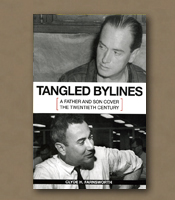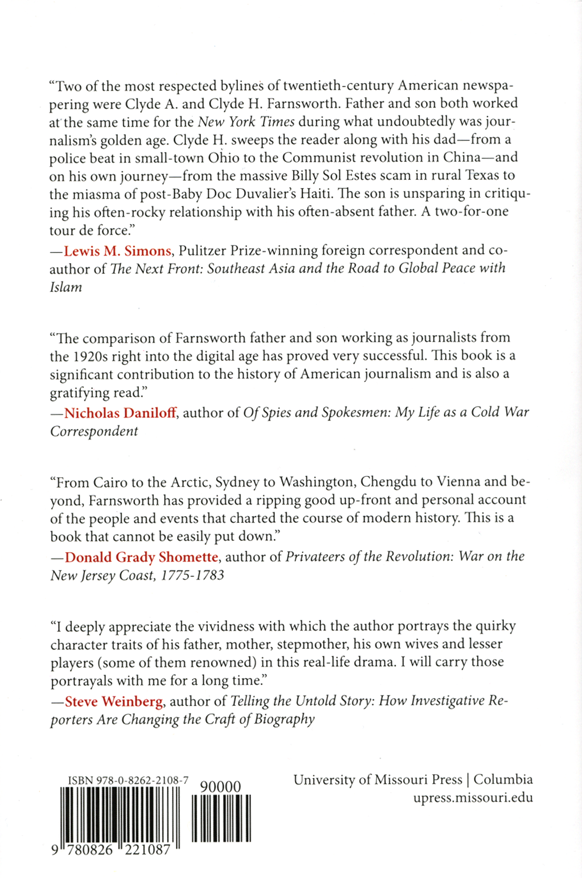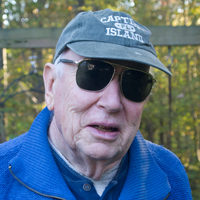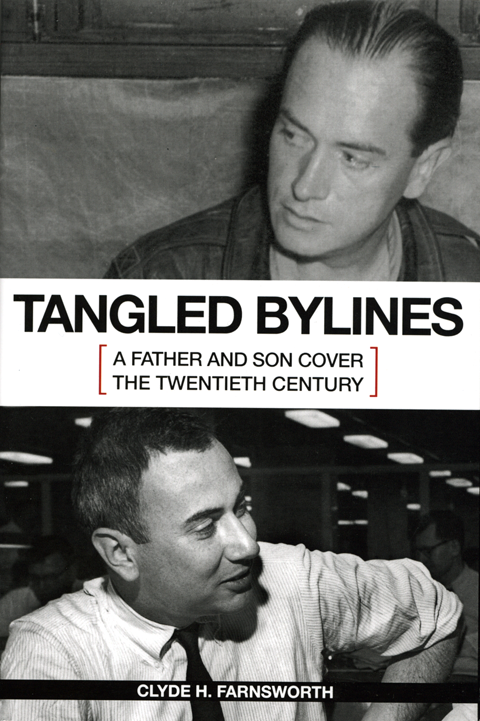
ISBN 978-0-8262-2108-7
available on amazon.com |
Tangled Bylines

| This memoir of father and son journalists—both named Clyde Farnsworth—draws on the unfinished autobiography of the authorís father. Largely biographical, this book can be read as a panoramic history of American newspaper journalism in the twentieth-century, covering Prohibition gangs, prison fires, and botched executions in the 1920s and 1930s, to global war, the shaping of postwar Europe and Asia, and Americaís emergence from the Cold War. Tangled Bylines includes off-beat encounters with Amelia Earhart, Douglas MacArthur, Charles de Gaulle, Winston Churchill, and Simon Wiesenthal. |

From its startling premise to its high-stakes conclusion, Clyde Farnsworth's debut novel delivers top-notch suspense through a devious journey of twists and turns, betrayal and treachery. Russian physicist Dmitri Sherbatov has discovered a means of creating artificial gold and defects to Israel with the knowledge, but not before attracting the attention of the Russian and American governments. The U.S. recruits Professor Hillsdale Landover to infiltrate the high-security lab where the Mossad has installed Sherbatov. With the help of Israeli physicist Rachel Ravid, Landover is successful, but together the two discover that it is not the Israeli government that will profit from Sherbatov's gold, but a small cadre of Mossad Army officers, with the CIA deeply involved. These powerful men will do anything to keep their secretincluding terminating Landover and Rachel before they can go public with their astonishing story of greed and lust for power. ïThis is a brilliant debut from a top New York Times journalist. ïCount on Farnsworth's New York Times contacts for great publicity.
https://www.amazon.com/Shadow-Wars-Clyde-Farnsworth/dp/1556115180/ref=sr_1_2?ie=UTF8&qid=1495494935&sr=8-2&keywords=clyde+farnsworth
Amazon.com Review
Add New York Times writer Clyde Farnsworth to the ranks of foreign correspondents who enter the thriller world with all their information-gathering equipment turned up to full volume. In Shadow Wars, Farnsworth invents a Russian physicist who discovers a way to make the ancient alchemists' dream of turning lead into gold come true. But his anti-Semitic superiors reject his theories, so Dmitry Sherbatov sneaks away to Israel to continue his work. A feud within the Israeli secret service soon brings the CIA and the Iraqis into the picture. Farnsworth's journalistic abilities work to keep the story credible, while his fictional talents have a field day with scenes of stealth and action.
From Library Journal
"We know too much," Israeli physicist Rachel Ravid tells American physicist Hillsdale Landover. "Washington will write you off like a loan to Zaire." The White House has recruited Landover to investigate rumors that Israel has discovered a way to create artificial gold. The rumor is true, but the gold is being diverted to finance a right-wing army plot against the government. The novice spies are among fearsome enemies: former KGB agents, Mossad muscle, an Arab killer team, and a rogue CIA agent. As the body count rises, the White House denies all knowledge of Landover and the Israelis declare Rachel a dangerous traitor, to be shot on sight. The book is slow to take off, and the juggling of multiple plot lines is a bit awkward, but novice novelist Farnsworth has penned a thoroughly enjoyable tale of rip-roaring high-stakes adventure. Recommended for all public libraries.?David Keymer, California State Univ., Stanislaus
Copyright 1997 Reed Business Information, Inc.
From Booklist
This first novel by former New York Times writer Farnsworth is familiar in many ways: a Russian scientist defects to Israel, and the Americans want to find him and make his new discovery their own. They recruit a prominent American physicist to find the Russian and bring his secret back. The physicist soon uncovers a rather diabolical plot. So far, it's a typical thriller. But Farns-worth manages to keep the proceedings fresh by going way out into left field to find his fictional scientific breakthrough: the Russian scientist has discovered a way to make artificial gold, cheaply and efficiently. By altering the world's economic structure, his discovery can literally destroy countries. This is not a great novel--aside from its typical plot, it features several characters who will seem mighty familiar to readers of political thrillers--but it ultimately satisfies, largely because its treatment of alchemy as a scientific reality is downright fascinating. David Pitt
|




